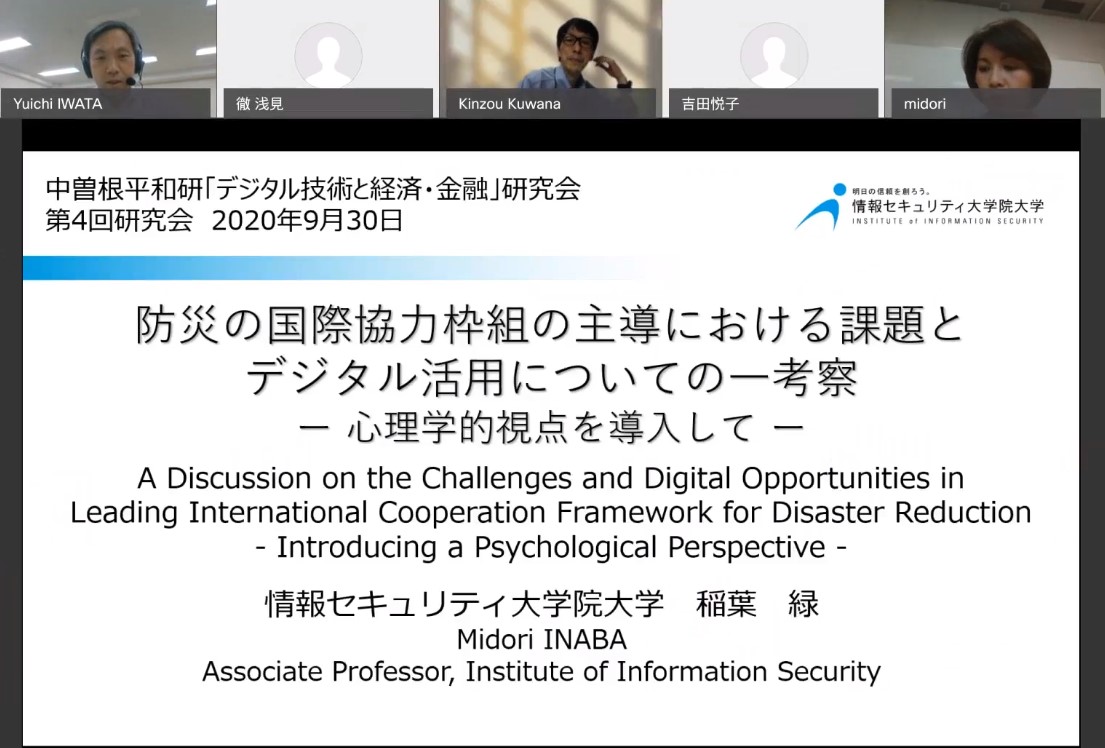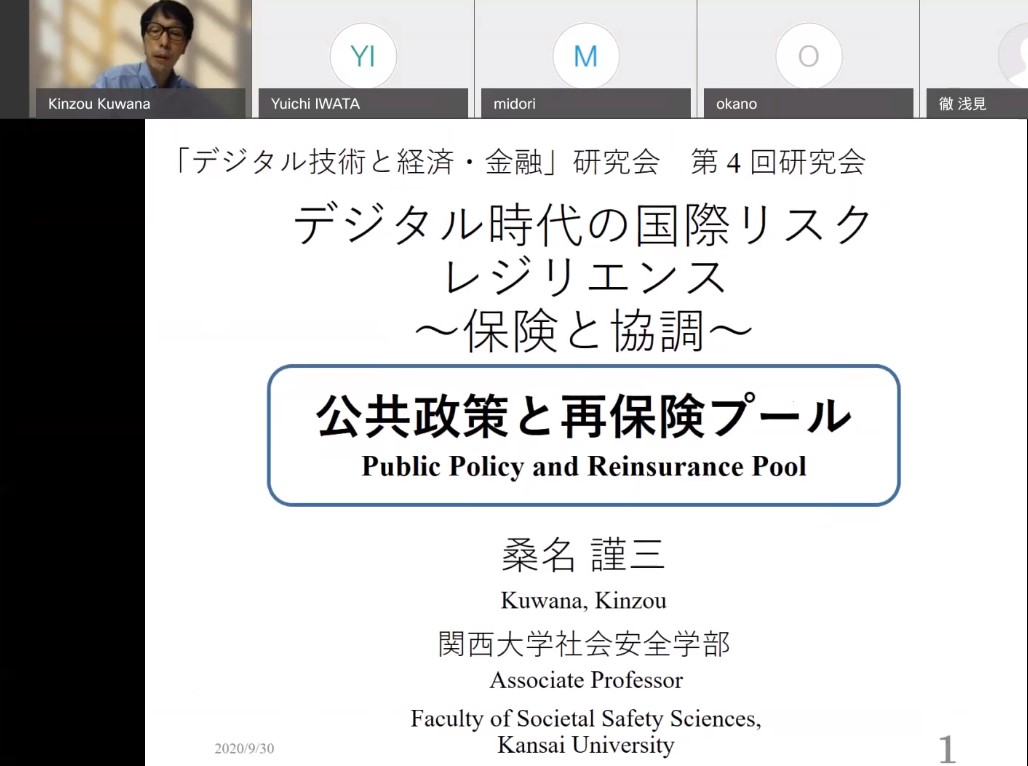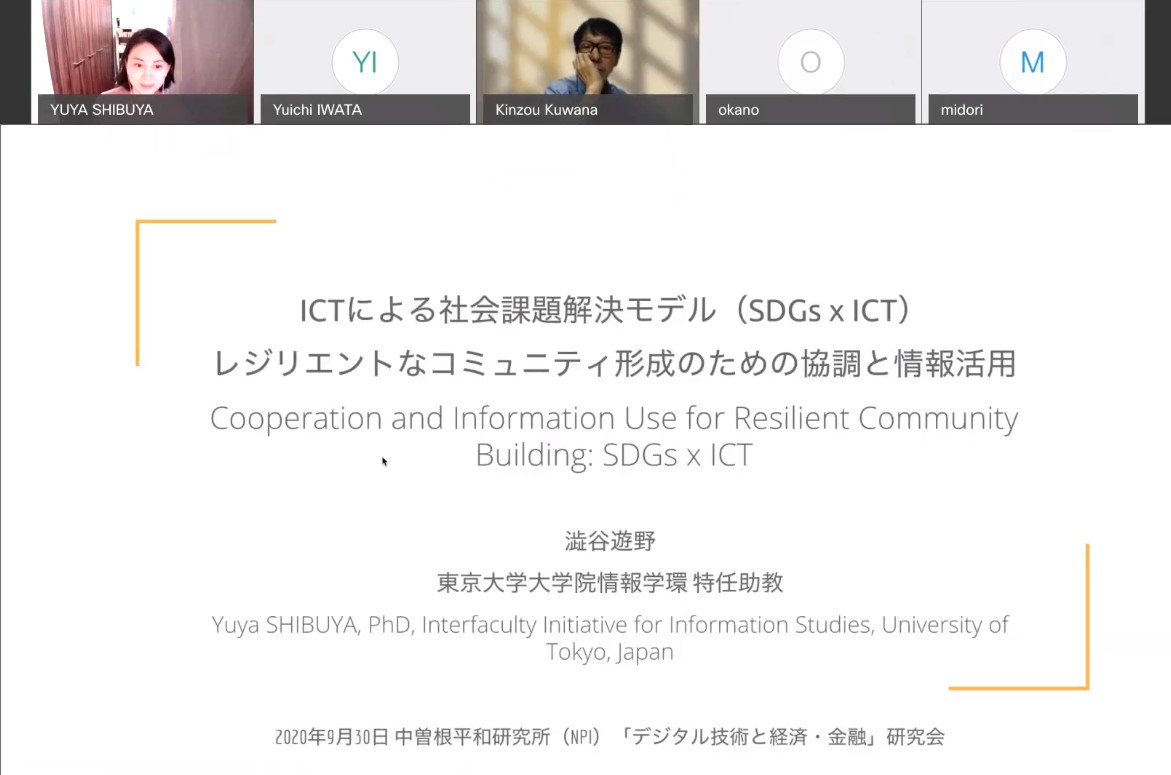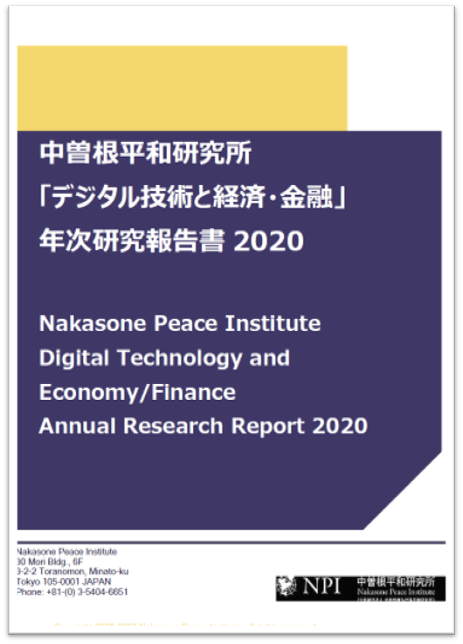2020/10/12
" International Risk Resilience in the Digital Age: Insurance and Cooperation " ("Digital Technology and Economy/Finance" Study Group)
The Nakasone Peace Institute held the web conference on "International Risk Resilience in the Digital Age: Insurance and Cooperation" with Dr. Midori Inaba (Associate Professor, Institute of Information Security) , Dr. Kinzo Kuwana (Associate Professor, Faculty of Societal Safety Sciences, Kansai University), Dr. Yuya Shibuya (Project Research Associate, Interfaculty Initiative in Information Studies, University of Tokyo), and other regular members, on September 30th 2020.
1 Presentation " A Discussion on the Challenges and Digital Opportunities in Leading International Cooperation Framework for Disaster Reduction -Introducing a Psychological Perspective- " (Dr. Inaba)
■Why Disaster Prevention Tends to Take a Backseat to Risk Management, but is Still Economically Necessary?
As a general practice in risk management, there is a limit to the amount of resources available, so it is difficult to uniformly implement countermeasures against all risks, which leads to a bias. Therefore, there is a tendency to start with the easiest countermeasures first and then move on to the later ones, which results in the problem of not starting with the later ones.
One of the features of measures that tend to be put off is that they are greatly affected by the uncertainty of predicting disasters and other events. In this sense, disaster prevention measures are one of the things that tend to take a back seat, not to mention the floods that have been occurring frequently in Japan in recent years.
At the same time, from the perspective of sustainable economic development, international cooperation to improve resilience to natural disasters, especially in developing countries, is gaining in importance. However, there has not always been a real boost in terms of disaster management.
Nevertheless, the economic reasons for the need for disaster reduction go back to the idea expressed at the beginning of this section: resources, in other words, the amount of money available for recovery and reconstruction, is capped. Another reason is to prevent larger-than-expected disasters from causing damage that would not be covered by insurance or public compensation, which could have a greater negative impact on the economy, including the supply chain.
■The international goals of Japan in disaster prevention and the reluctance of other countries to do so
One of Japan's international goals in disaster reduction is to take the initiative in the global framework of disaster management cooperation. At present, Japan's direct bilateral disaster reduction cooperation has accounted for more than half of the world's total disaster reduction funding over the past 20 years. Japan's contribution to the United Nations Office for Disaster Risk Reduction (UNDRR) is the second largest in fiscal year 2019, after Sweden, and is headed by Mami Mizutori, a former member of Japan's Ministry of Foreign Affairs.
On the other hand, Japan's presence in the field of disaster management may be an indication of the passive attitude of other countries and institutions toward international cooperation in disaster management. The key to breaking through this reluctance, in particular, will be to strengthen cooperation with developed countries that can provide resources (both financial and human).
So what is the reason for the aversion to international cooperation in disaster management by other developed countries and institutions? Three factors are likely to be considered: (1) the small benefit of cooperation, (2) the small perceived benefit of disaster reduction costs, and (3) the huge size of the disaster reduction costs themselves.
■New Opportunities for International Cooperation on Disaster Reduction (mainly among developed countries) through Digital Technology
Of these three factors, (2) and (3) are related to forecasts and assumptions, and improving the accuracy of disaster reduction forecasts through the use of digital technology could lead to possible enhancements in international cooperation.
However, this improvement in accuracy may increase the total burden of the disaster reduction efforts. Multilateral cooperation will become increasingly important in order to reduce the burden (share). Moreover, by promoting this, developed countries, which have felt little benefit from cooperation in the past, may be inspired to take a new approach to multilateral cooperation (including the use of their own technologies).
Under such circumstances, how can Japan maintain its grip on the international initiative while making use of the advantages of its role as an advanced country in disaster management, including the promotion of standards and programs and international standardization? Japan's strategic multilateral disaster management diplomacy based on such "beneficial cooperation with developed countries" will become increasingly important in the future.
2 Presentation " Public Policy and Reinsurance Pool" (Dr. Kuwana)
■What is "reinsurance"? -Concept & Effects
Private insurers need to diversify the risks they have taken on (so that they don't go out of business with huge compensation payments for certain losses). They have a system called "reinsurance" to take care of this. Reinsurance companies have been doing business in Japan since the late 1800s, and in Europe for more than 400 years before that. Currently, five of the world's top six reinsurers are in Europe.
The concept of reinsurance is that large risks can be subdivided into small pieces and shared by insurance companies around the world, resulting in co-existence and co-prosperity for insurance companies around the world. In the case of natural disasters, for example, Japan was the only country directly affected by the Great East Japan Earthquake, but Japanese insurers received help from European insurers under the reinsurance scheme. Of course, the opposite situation is also the case. However, on the other hand, the global market for property/casualty insurance is affected by the global insurance/reinsurance market, which can lead to a less stable situation.
The effects of reinsurance. Every time a major catastrophe occurs, a large amount of money is claimed for, and if the risk is not deducted by reinsurance, the total loss ratio of Japanese insurers would exceed 90% at the time of the 2011 Great East Japan Earthquake. However, due to the "ceding" of the disaster, the actual loss ratio has been kept at around 60%.
In a situation such as the recent pandemic caused by the novel coronavirus, unlike natural disasters, the risk is spreading around the world, and an international reinsurance framework in which governments can be partially involved (mainly at the time of start-up) is more desirable. An international "reinsurance pool" (as noted in the OECD report) would be a good idea.
■What is a "reinsurance pool"? As for the international use of reinsurance
Reinsurance pools are a mechanism whereby companies that underwrite reinsurance get together by loss type (e.g., residential earthquake insurance, nuclear energy insurance, automobile bodily injury insurance, etc.) and try to share the risk (redistribution of money) so that the loss ratios of the participating insurance companies are equal (under exemptions such as antitrust laws).
While this increases the possibility of insuring against huge risks, it also has the possibility of reducing the efforts of individual companies through the fixing and commonality of loss ratios.
When considering the establishment and use of international reinsurance pools in response to the current corona pandemic, the number of deaths and the level of economic impact vary from country to country, so if the current situation were to continue and a uniform pool was established worldwide, Japan would continue to overpay. Therefore, when jointly considering an "international reinsurance pool (with governmental involvement)", it would be desirable to consider maintaining Japan's independence in some way.
While the international use of reinsurance is good in terms of risk sharing, there is a concern that the benefit and loss of reinsurance may become clear and fixed in cases where the situation is global and clear-cut on a country-by-country basis. Therefore, in the national interest (including the maintenance of the domestic insurance industry), a combination of "open" and "closed" reinsurance schemes is essential to keep the reinsurance program going.
3 Presentation " Cooperation and Information Use for Resilient Community Building: SDGs x ICT " (Dr. Shibuya)
■The importance and challenges of community-based data applications (especially during disasters)
So-called big data have provided a range of possibilities for disaster response, recovery, and reconstruction. On the other hand, the situations of the most vulnerable people may not be immediately included, reflected, or visible in such data. This is even more so where issues of data privacy come into play. Therefore, the perspective of "how to create, obtain, and utilize community-based data" is equally important for disaster response and recovery and reconstruction.
Community-based data sensing initiatives dedicated to social and environmental issues have become a worldwide phenomenon in recent years. They have made various invaluable contributions in terms of data, community-building, and outreach yet such initiatives tend to face difficulties to sustain over time. Exceptional examples of globally well-known long-living initiatives include the air pollution monitoring project originated in Germany and the radiation monitoring project originated in Fukushima, Japan.
■Key points to enable broader use of both community and state-owned data
The two community-based cases mentioned above go beyond merely technology applications. They have accelerated collaboration and cooperation through discussions involving people and established entities while maintaining their community in a decentralized way to achieve both scale expansion and autonomy. The U.S. and Europe have been the main source of financial support in both cases.
Aside from community-based data initiatives, on another note, it is worthwhile to note that the Japanese government's promotion of data provision and utilization is very diverse and covers a variety of fields. Yet, many of the portals are narrowly targeted at experts, and it can't be said that they are horizontally coordinated and unified as a portal site (especially on a cross-ministry basis). Therefore, it is very important to " improve the ease-of-find (for the searcher)".
4 Discussion
■Main issue 1: Disaster prevention, insurance & data accumulation
○Certainly, in the Corona this time, data sharing from large organizations such as Google/Apple and global academic networks centered on U.S. universities were notable. At the same time, however, there are other mechanisms for sharing data that were created from the bottom up, such as the mask stock information in Taiwan.
Of course, compared to the time of the Great East Japan Earthquake in 2011, the current corona crisis shows a definite increase in the use of social media. However, bottom-up transmissions based on social media are still an ongoing issue, and linkages in the use of data also have a number of challenges.
Such challenges may include efforts to comprehensively link issues and functions across the entire landscape, as well as the work of developing a system that makes such bottom-up data collection and collaboration work more valuable so as to enhance financial support, including the donation system.
○As a background to the regional imbalance of data. One of the main reasons for the problem is that social issues and economic incentives (in terms of data collection) do not align well with each other. Furthermore, even if data is collected, there are many regions that have not yet considered how to make use of it from a privacy perspective.
While big data can solve social problems, it is also necessary to pay attention to the aspect that it can reproduces the problems in existing social structures, and that the real issues may lie in situations where social media cannot (or do not) transmit data.
○The business model of the insurance is to collect data (insurance-related disasters, losses, etc.), run models, decide on the price of premiums, and sell them. The competition to use IT in both traditional and cutting-edge fields is intensifying.
In this context, as reinsurance companies compete with each other on a global scale, the top-ranked reinsurance companies in the U.S. and Europe are gathering more and more data. Companies that build models and work systematically with them have an enormous advantage (in both negotiation and decision making).
In addition, when setting up a risk-sharing mechanism between insurance companies for reinsurance, there is a bargaining game to be played, with data analysis of loss trends. Once the mechanism is in place, the scheme (rules for calculation, etc.) may not work equally for all participants, and as a result, it might lead to the locking in position of "loss" and "win".
○Even though we have data, it is difficult to link them together and to see them in a comprehensive way. In this situation it is important, including from a business perspective, to develop people who can play the role of a data "curator" or "librarian".
■Main issue 2: Future international opportunities for Japan
○The Great East Japan Earthquake has increased the appeal of Japan's disaster reduction efforts worldwide, including at the United Nations World Conference on Disaster Reduction. Developing countries are highly appreciative of Japan's provision of disaster prevention know-how, and Japan has been able to send personnel, including executives, to the World Bank.
It is important to continue to accelerate this trend, as well as to promote the new possibilities of cooperation through digital applications to developed countries, which have relatively low incidence of natural disasters, and to build a solid base of allies in the field.
○As for the use of insurance for international disasters, following Japan's initiative in establishing pandemic insurance at the World Bank, Japan could take the lead in creating an optimal international insurance system by coordinating between countries in consideration of regional differences.
However, given the fierce international competition in the reinsurance market among major reinsurance companies in Europe, the US and elsewhere, it would be challenging for Japan (and the industry) to strengthen its position without incentives and other mechanisms to ensure profits for Japan, considering the strategies and visions of the leading reinsurers.








